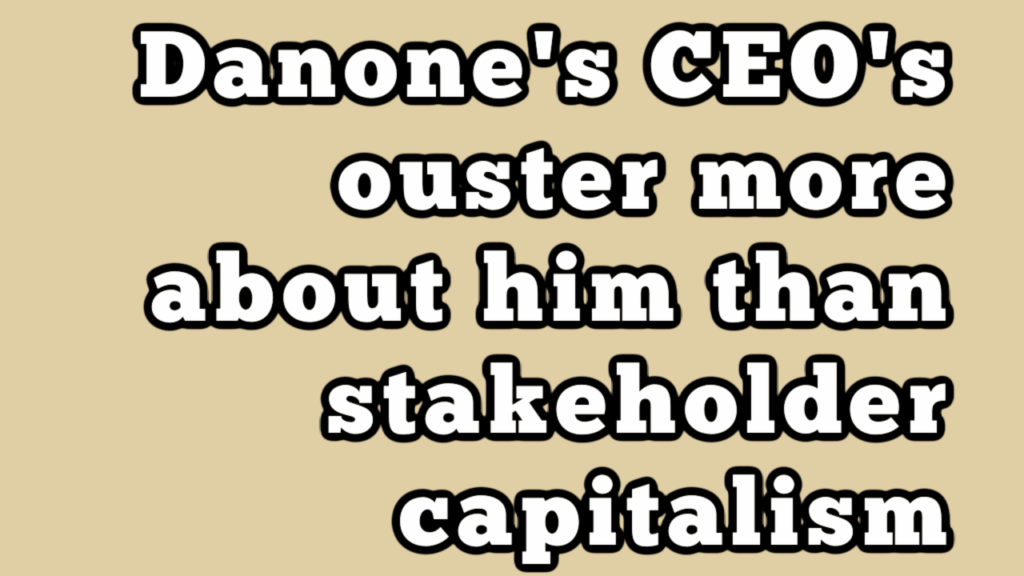Danone CEO’s ouster more about him than stakeholder capitalism

– The ouster of Emanuel Faber, Danone’s CEO, rocked sustainability circles as he was an outspoken ESG advocate.
– However, the initial news was tempered with revelations that his ouster was more about his management style – and the company’s underperformance – than stakeholder capitalism generally.
The summary for “The Myth of the CEO Hero” by Mary Johnstone-Louis and Charmain Love includes:
In the quest to design a corporate ecosystem that reliably — and profitably — meets the needs of people and the planet, there can be no singular heroes. Addressing the interconnected emergencies facing our societies and planet will demand systems change, and no CEO can deliver this change on their own. CEOs and policy makers must engage deeply with the question of how to ensure business is an enduring force for good. The authors present four systems-change principles for businesses deciding how to navigate the growing call to focus on stakeholders, not just shareholders.
This article by Tom Gosling does a pretty good job of explaining the circumstances – and meaning – of the ouster of Emanuel Faber, Danone’s CEO. Here are the three lessons learned from Tom:
– Most important is that purpose can’t protect a CEO from underperformance. And nor should it. Danone’s underperformance of other FMCG peers equated to a value gap of around €20bn. Even if Danone added a lot of stakeholder value, that’s a big bill for the shareholders to pick up, including ordinary people saving for their futures. And creating value, at its core, is nothing more than making more with less over the long term – the engine of progress.
– The second lesson is that making stakeholders happy is relatively easy. Much harder is doing it at the same time as growing revenues and profits. The trick of patting your head and rubbing your tummy is one that not everyone can pull off in the way that, for example, Unilever consistently has over the last decade. This can only be done if a company’s purpose goes to the heart of how it creates value. Otherwise, purpose can be a distraction from the business of business.
– The third is that in a capitalist system, companies will always have to create value for their shareholders. Responsible business advocates place far too much weight on governance reforms like B CORP™ as the solution to all our problems. There’s a danger in insulating companies too much from shareholder scrutiny – and as the Danone case shows, when push comes to shove it’s not effective anyway. The best defence is to be a great company.
And here’s an excerpt from this Financial Times editorial:
How business leaders sell their vision matters, too. Faber’s management style put some board members’ and investors’ backs up. Many US chief executives who signed the Business Roundtable 2019 statement on purpose, diluting shareholder primacy, did so without consulting board directors, according to Harvard Law School researchers. Despite his early success in rallying board and investors round his long-term vision, even Paul Polman, Unilever’s former chief executive and another vocal evangelist for purpose, eventually became disconnected from shareholders. The approach of his lower-profile successor Alan Jope may provide a better model of how to interweave sustainability and profitability.
Faber’s fall comes at a critical point. A backlash against purpose-driven capitalism was overdue. Activists of the Friedman school are now doing battle with a new tribe of campaigning ESG investors, who believe their companies face extinction if they do not pursue environmental and social goals.
Chief executives’ job — their mission, even — has always involved reconciling multiple demands. The mess in the Danone boardroom is a reminder that distractions from the core goal of making a profit can be dangerous. It does not, however, signal that leaders should rein in their ambition to go further and reassert the role of companies in society. The benefits for both business and society when they take account of the long-run social and environmental impact of their activities have only become clearer in recent years. To revert now to simplistic and damaging pursuit of crude share-price maximisation would be a mistake.
Commenting on this Financial Times article, Raz Godelnik notes:
There are many lessons that could be learned from the fall of Danone’s CEO Emanuel Faber – but in my opinion, the key lesson is the ineffectiveness of stakeholder capitalism to make business more sustainable as long as it is subjected to a mental model of shareholder capitalism.
Meaningful change requires a new mental model in business that puts sustainability before profit, not alongside it. Sustainability-as-usual (or ‘humanist’ capitalism as Faber called it), which champions the latter, is just not good enough.
This article gets into whether Danone’s board will live up to their legal accountability to stakeholders that 99% of its shareholders supported just last year. And I’ll leave you with this note from Insead’s Sylvie Bergeron:
Comments about the departure of the CEO and Chairman of Danone are taking a singular magnitude. Many observers have interpreted his dismissal as a victory of the shareholders pact over the social pact. Remember that the CEO is elected or deposed by a Board of directors, made up of shareholders, of course, but also employees, suppliers, consumers, state representatives.
For all these stakeholders represented on the “board”, Danone is much more “than a company with a mission”. Several board members ended up leaving the board meetings, according to insiders. Whereas Faber was wrapping the organization in the ESG mantle of social and environmental responsibility, its stakeholders were struggling to make their voices heard. Even Riboud, the founder’s son, “independent” board member, and former Chairman, recently admitted in the press that his “poulain” had neglected the organizational values, by talking too much about the mission.
